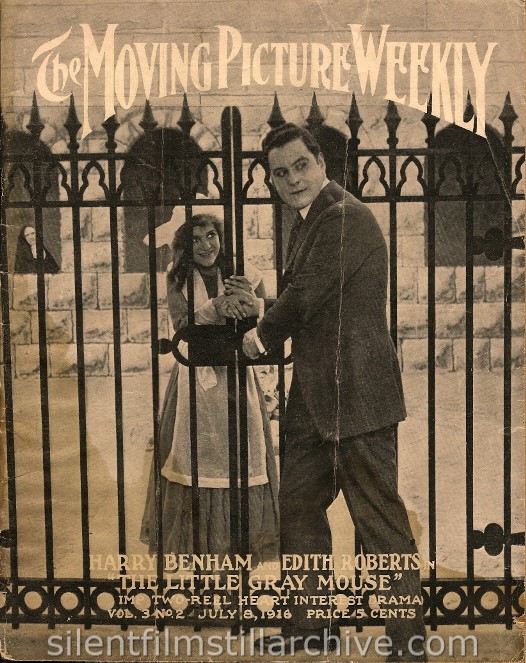![]()

The Little Gray Mouse (1916)

The Moving Picture Weekly magazine
HARRY BENHAM AND EDITH ROBERTS
"THE LITTLE GRAY
MOUSE"
IMP TWO-REEL HEART INTEREST DRAMA
VOL. 3 NO. 2
JULY 8, 1916 PRICE 5 CENTS

"THE LITTLE GRAY MOUSE"
IMP Two-Reel
comedy-Drama, written by Catherine Carr. Produced by J. W. Kelly (sic).
Clever child foils badger game workers in shadow of convent.
CAST
|
Felice, The Little Gray Mouse |
Edith Roberts |
|
The Mother superior |
Nellie Slattery |
|
James Webster, a confidence man |
Paul Panzer |
|
Mrs. Webster, his wife |
Inez Marcel |
|
Jack Stanley |
Harry Benham |
FELICE, the only child of a French widower, a soldier of fortune, is left at a convent when he decides to enlist and rejoin his old regiment in the French army. Felice is heart=broken at her father's departure, but the nuns comfort her. They receive word that the father has been killed, and, on the advice of the Mother superior, she decides that Felice shall remain at the convent, but as she is without money for her boarding expenses, she is allowed to help with the housework.
Jack Stanley, a young businessman, with his semi-invalid father, a widower, arrives with Mrs. Webster, a beautiful young woman posing as a widow, who acts in the capacity of housekeeper and companion to the elder Stanley. A strict diet has been prescribed for the invalid, and the convent is recommended as a place where Stanley may secure eggs and honey and other delicacies. Delicacies seem to be scarce, and Mr. Stanley finds himself deprived of the things he expected, as the nuns regret they cannot supply his wants. Felice overhears the request for delicacies which is made personally by Jack in his father's behalf. There-upon, Felice smuggles out a basket of them from the cellar of the nunnery, intending to leave the basket surreptitiously at the Stanley home. Mice scamper across the cellar floor during her foraging escapade. Subsequently she meets Jack on the road, confessing to him that the basket of delicacies is intended for his father and he drives her back to the convent in his car.
Felice falls in love with Jack, and he is very much taken with the Little Gray Mouse, as he calls her. Mrs. Webster, although posing as a widow, is in reality married to Jim Webster, "a gentleman crook," who is stopping at a nearby hotel by prearrangement. Webster is planning to work the badger game, and after bleeding the elder Stanley of a large sum of money, to make his get-away with the proceeds. Upon the night settled for the badger game, Jack is summoned to New York by a fake telegram. Felice upon the same evening determines to carry out another basket of delicacies to the Stanley home. Under cover of darkness, she makes her way to the Stanley home, encountering on one on the road. Finding the house quiet, she investigates the lower floor. She makes her way to the drawing room and is startled by the arrival of Webster. She conceals herself in an alcove. Mrs. Webster joins her husband. They discuss the plan of the badger game. Mrs. Webster is on the verge of weakening, but her husband forces her to consent to go through with the proposed black-mailing scheme, announcing that he will bring a pal, Tim Morse, to intimidate Stanley.
Meanwhile, Mrs. Webster has dismissed the servants for the day. She promises, in the hearing of Felice, to carry out the badger game. Felice, not knowing what a badger game is, but conscious that it is something criminal, escapes from the room, and starts on a mad run for the convent.
Jack's machine having broken down he is taken up by a friendly motorist, who asks the way to the convent where he is to see his daughter. Felice returns to the convent, disheveled and breathless. She rushes to the Mother Superior with the story she has just overheard. Felice frantically tries to impress upon the Sisters the seriousness of the situation, but they will not listen to her, and are about to impose a heavy penance for what she has done, when the stranger and Jack arrive. The stranger recognizes in Felice his daughter. Felice, her father and jack race in the machine to the Stanley home. Webster and Morse are caught in the act of trying to force the elder Stanley to give up a large sum of money, after accusing him of having hade love to Mrs. Webster. The imposters are overpowered and exposed, and the "Little Gray Mouse" leaves her convent cage for the golden land of love.
From The Moving Picture Weekly, July 8, 1916, page 26. (Note: This exact synopsis is also on page 517 of the July 17, 1916 issue of the Moving Picture World magazine.)
with Edith Roberts and Harry Benham. Directed by J. Winthrop Kelley. IMP/Universal.
More Information on this film...

This work (The Little Gray Mouse (1916),
by Imp/Universal),
identified by
Bruce Calvert, is free of known copyright
restrictions.
Books
(none)
Last Modified March 4, 2014.



















